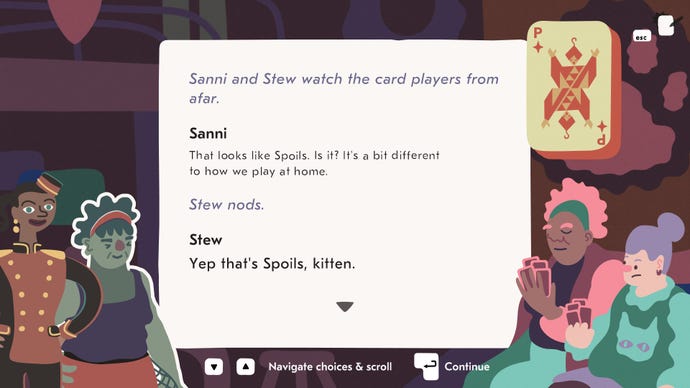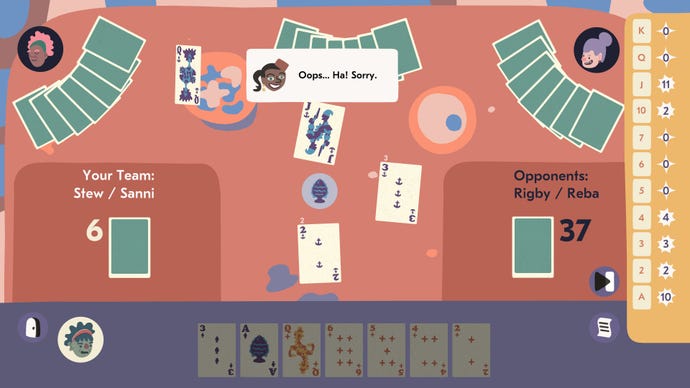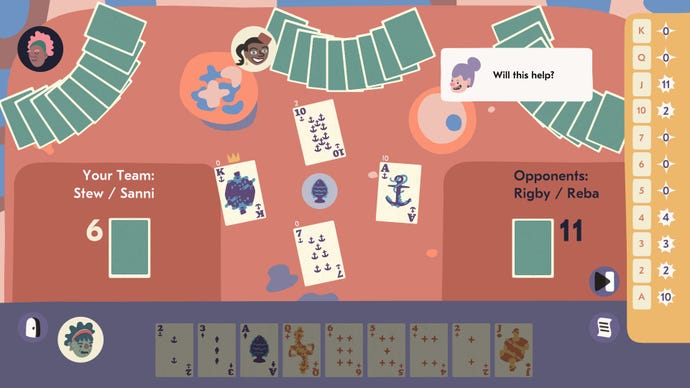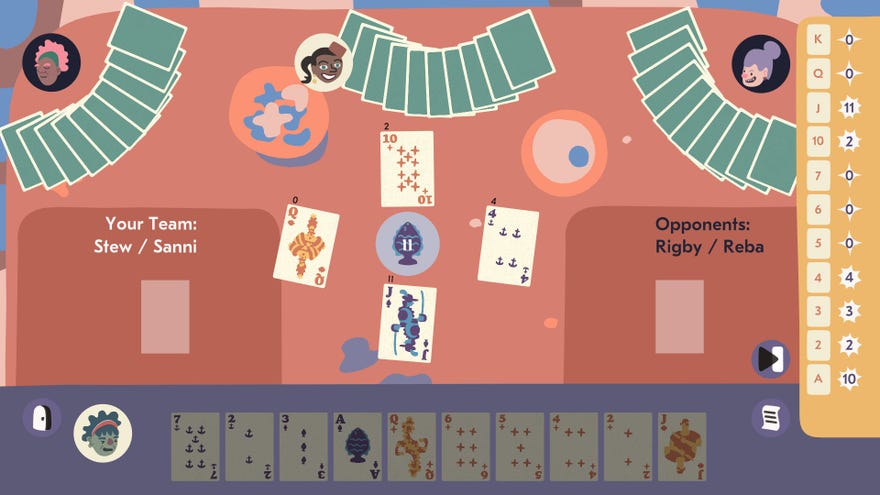How a well-crafted minigame can bring a whole fantasy world together
Discussing Saltsea Chronicles' wonderful card game
One of the things I like best about Die Gute Fabrik's forthcoming Saltsea Chronicles is an optional feature. It's a card game, Spoils, which you can play while sojourning upon the game's islands and searching for clues about your ship's missing captain, Maja. Here's how it works: two teams of two characters take turns to play cards, moving in clockwise around a table. Players must follow the lead player's suit, and the highest-scoring card wins the trick, with four tricks comprising a round. It might sound like a straightforward competition, but different islands offer different house rules, and there are twists that reflect the game's ethic of community, mutual respect and diversity, and help animate the detail of its gently post-apocalyptic oceanic world.
The winning card from each trick is handed to the loser, so victory is, in its way, an act of generosity. Score more than 100 points in a round, meanwhile, and the "Hoarding" rule means you must relinquish those points to the other team. As Die Gute Fabrik's CEO and creative lead Hannah Nicklin observes, this fits the anti-capitalist politics and mythology of Saltsea, in which "hoarding is sort of seen as the apocryphal cause of the flood". The Spoils tutorial menus riff on this with a cute but mildly unsettling image of a sinking ship.
I've barely scratched the surface of Saltsea Chronicles, which Katharine has written about in depth. I'll confess, I have yet to play Die Gute Fabrik's previous Mutazione, either, though not for lack of interest. But I'm already in love with Saltsea Chronicles' card game, which feels like that special variety of mini-game that unobtrusively binds the micro and macro of a sumptuous fiction together, its mechanics supporting and reinforcing those of the overarching, chapter-based narrative.
The resonance of the Hoarding rule aside, I enjoy how pairing the game's neurodivergent, queer, multilingual and multi-ethnic cast into teams echoes the act of choosing who will visit each island. Much as islands appear different, depending on the people sojourning there, so it feels like games of Spoils play out differently, depending on the participants. When teaming up with the eager and energetic Sanni, for instance, I felt the need to hedge my bets to allow for the fact that she would probably overreach herself. It's hard to gauge how much of this is my own projection, but either way, it's delightful to think about.

Spoils isn't Nicklin's creation. It's the work of Alexandra Labusová and Daria Radu, two students at IT University of Copenhagen, who joined Die Gute Fabrik in 2021 as interns. "[They] said, 'Hey, we're looking for an internship,' and normally that doesn't fit into our plans and we can't support it. But in this particular case, we were quite early on [in development] and we could think about how we could make room for these two interns."
Nicklin and her colleagues at Die Gute Fabrik put their heads together and devised a role for Labusová and Radu "that's quite self-contained, that they could do as part of their thesis, but also that could end up being a useful part of the game". The pair went to work in collaboration with creative producer Ben Wilson and game designer Douglas Wilson (no relation). "I sort of put them all together to work on this card game," Nicklin says. "And they just took the brief and really ran with it."


Aside from its role as a lens upon the Saltsea world, Nicklin thinks the card game is an invaluable means of pacing. "Because one of the problems with player agency in storytelling is that the pacing is up to them, and you have to give them the tools to make the pacing effective," she explains. Good game pacing is partly a question of clean structure, Nicklin goes on - Saltsea Chronicles draws clear distinctions between chapters, between "special story actions compared to non-major clues", and between "the little kind of interjections compared to the deep conversations". But mini-games can be helpful too. "What the card game allows is for people who want to step away from reading for a bunch of time, to step into a different modality."
You don't have to play cards, again. "It's not everyone's cup of tea, playing a card game, right, and there are some people who won't need to," Nicklin says. "And if you don't engage with the card game, you'll miss out on some achievements. But you won't lose out on a central part of the game. However, if you're someone who needs to step away, but still wants to be part of the world and part of the game, the modality of playing a card game gives you a really useful tool in your agency and pacing the playing of the game, and the story of the game."
Nicklin is deeply impressed by how Labusová and Radu have designed Spoils to further various facets of Saltsea Chronicles. Certain islands having their own house rules, for instance, helps convey the idea that travel between islands is rare in this peaceful, but melancholy stretch of ocean. "They also worked with us to think through things like: would people have the concept of Kings and Jacks? No, but they probably had card decks, so that's why they're called Kays, Jays and so on, and then the suits being shells and fishes... I think they did a wonderful job. I take very little credit, except for bringing on Alexandra and Daria, and making room for them within our process. The rest was absolutely down to those four."
Disclosure: Hannah Nicklin has written for RPS as a contributor in the past.



